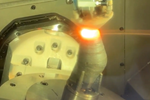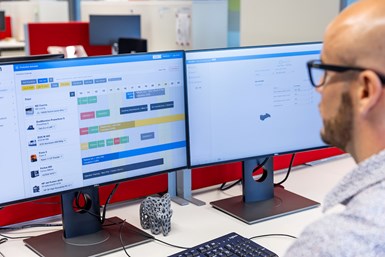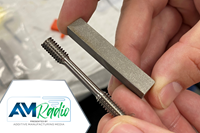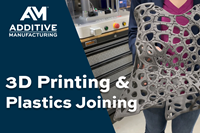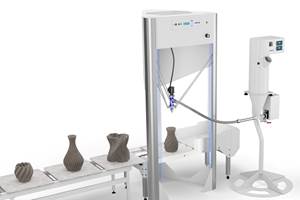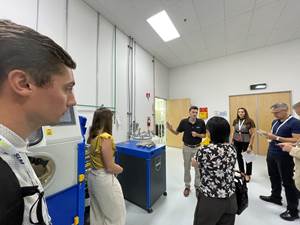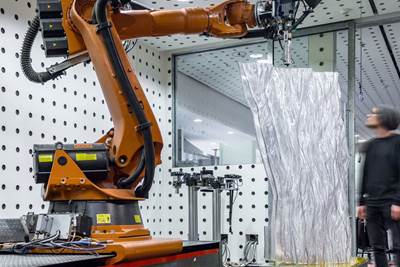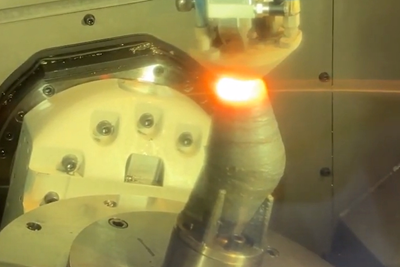Materialise Develops CO-AM System for Holistic Process Quality
Formnext: QPC users can collect and monitor data during the different stages of product development —including research, validation and production — giving additive manufacturers a holistic view of their process and its interrelationships.
QPC users can collect and monitor this data during the different stages of product development, including research, validation and production. Photo Credit: Materialise
Materialise’s CO-AM Quality and Process Control (QPC) system is a software solution for companies that want to take additive manufacturing (AM) quality and process control in certified manufacturing to the next level. The QPC enable manufacturers to track, monitor, analyze and correlate all data critical to part quality.
The QPC interconnects AM data sources such as 3D models, raw materials, process parameters, in-situ process monitoring, postprocessing and quality inspection. QPC users can collect and monitor this data during the different stages of product development, including research, validation and production. This will provide manufacturers with a holistic view of their process and its interrelationships.
Earlier this year, Materialise introduced the first QPC Layer Analysis module, a software to analyze and correlate layer data from the 3D printing process. The QPC Layer Analysis module has been further developed to include more in-situ process monitoring data sources and to correlate its results with CT scans. The new QPC Process Lab module fosters collaboration between different teams to centralize research and production data in a structured way. This enables them to accelerate product development, support process validation, and seamlessly monitor process stability and material properties from research to actual production.
The QPC system is part of the Materialise CO-AM software platform. CO-AM gives manufacturers access to a full range of software tools to plan, manage and optimize every step of the 3D printing process. It provides access to complementary solutions from Materialise and third parties, including CO-AM partner solutions for design automation, mass customization, automated labeling and various postprocessing technologies. CO-AM enables AM users to connect and manage technologies from different machine builders over one platform.
Materialise is also collaborating with DigiFabster, a cloud-based software as a service (SAAS) quoting automation and e-commerce solution for advanced manufacturing companies. DigiFabster’s eCommerce portal, automated quoting and costing, and payment automation will be integrated into the Materialise CO-AM software platform.
“It’s time to prioritize customer experience in B2B, especially when enabling AM service bureaus,” says Pieter Hens, Materialise senior partner manager. “Integrating DigiFabster’s solution into CO-AM closes the gap between front-end and back end.”
The fully white-labeled eCommerce portal uses machine learning to help manufacturers automate and accelerate their quoting process, saving time and costs. At the same time, their customers can get quotes around the clock. To facilitate customer support and accelerate business processes, the CO-AM integration enables streamlined management of order data in CO-AM's Order Management System. This will help manufacturers keep track of orders and give instant status updates to their customers.
“Speed and reliability are essential for manufacturing companies,” says Const Ivanov, DigiFabster CEO. “Working with Materialise, we will be able to offer a digital manufacturing workflow that offers a modern customer experience and helps users get paid on time. This partnership will offer significant value to our customers.”
Another partnership, this time with Ansys, driving the integration and performance of simulation for the 3D printing process. AM users often have to use one application for data and build preparation and switch to another to run simulations. This slows down build optimization and preparation and requires expert knowledge that occupies costly engineering capacities. Materialise and Ansys’ partnership will make simulation more accessible for all Materialise Magics users, helping them drive down costs and work more efficiently.
“Usability and performance are crucial when it comes to simulation,” says Chris Robinson, Ansys senior product manager. “By integrating Ansys technology into Materialise’s comprehensive software solutions, AM users can benefit from a seamless workflow using the gold standard in simulation.”
As a first step of their partnership, Ansys’ simulation technology, Ansys Additive Suite, has been introduced into Magics, Materialise’s leading data and build preparation software. This will create a seamless workflow, offer fast simulation, and lower the complexity of applying simulation results to the build preparation. Ansys and Materialise plan to explore further opportunities for simulation in the AM process.
“We look forward to supporting our customers with Ansys technology,” says Karel Brans, Materialise senior director Partnerships. “Simulation is a key element for metal 3D printing to improve cost-efficiency. Ansys and Materialise will work together to integrate simulation technology even further into the AM workflow and offer unparalleled connectivity.”
- Read about Materialise expanding its CO-AM Platform with seven technology partners and Magics integration. With the addition of the seven new partners, Materialise says it delivers on the promise to connect and automate all steps of the AM process, including automating design, labeling, machine monitoring and postprocessing.
- Learn more about how the enhanced Magics Software enables traceability, connectivity and automation. Materialise’s updated Magics workflow automation software helps improve product quality by creating an advanced digital thread connecting the entire manufacturing process.
Related Content
Wasp Polymer, Ceramic 3D Printers for Customized Serial Production
Formnext 2022: Italy-based Wasp offers 3D printing options for sustainable, customized serial production with polymers and ceramics.
Read MoreThe AM Ecosystem, User Journeys and More from Formnext Forum Austin: AM Radio #43
Sessions and conversations at the first U.S. Formnext event highlighted the complete additive manufacturing ecosystem, sustainability, the importance of customer education, AM user journeys and much more.
Read MoreMeet The Cool Parts Showcase Winners
The Cool Parts Showcase winners for 2023 were announced at Formnext Forum Austin. Watch the award presentation here.
Read MoreAMT’s PostPro Pure Offers Sustainable Vapor Smoothing Chemistry
Formnext 2022: This FDA-approved chemistry offers a green approach for vapor smoothing 3D printed parts.
Read MoreRead Next
At General Atomics, Do Unmanned Aerial Systems Reveal the Future of Aircraft Manufacturing?
The maker of the Predator and SkyGuardian remote aircraft can implement additive manufacturing more rapidly and widely than the makers of other types of planes. The role of 3D printing in current and future UAS components hints at how far AM can go to save cost and time in aircraft production and design.
Read More3D Printing Brings Sustainability, Accessibility to Glass Manufacturing
Australian startup Maple Glass Printing has developed a process for extruding glass into artwork, lab implements and architectural elements. Along the way, the company has also found more efficient ways of recycling this material.
Read MoreHybrid Additive Manufacturing Machine Tools Continue to Make Gains (Includes Video)
The hybrid machine tool is an idea that continues to advance. Two important developments of recent years expand the possibilities for this platform.
Read More



